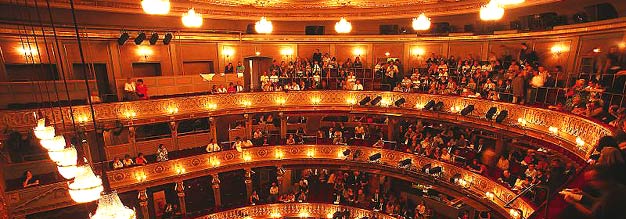- Available
- Limited
- Sold Out
Your Benefits With Us
Events in Vienna
Events in Salzburg
Popular Concerts & Operas
Event details
- Category: Operas
- Event: CAPRICCIO
- Date/Time: 02 May 2016 - 19:00
- Venue: Theater an der Wien
- Address: Linke Wienzeile 6, 1060 Wien/Vienna (Map)
- Other Dates: Show alternatives
TICKET CATEGORIES AND PRICES
No tickets available.Description
What is of greater fundamental importance for a good opera, the text or the music? Which element should be subject to the other? Stefan Zweig brought this question to the attention of Richard Strauss and wrote a scenario on this old dispute of music history. However, he soon dropped out of the project: as a Jew, his right to work was being increasingly curtailed by the National Socialists, who were also active in Austria, and in February 1934 he emigrated to England. But finding a replacement for Zweig was no easy matter. Joseph Gregor, Clemens Krauss, Hans Swarowsky and Strauss himself all toiled over the libretto until the beginning of 1941, and the work premiered on 28 October 1942 in Munich. Reflecting the subject matter, the text and music of Capriccio enter into a mutually beneficial alliance: in keeping with the quotations in the text that refer to the history of music, a wide variety of forms from the history of opera are worked into the score. Strauss himself saw Capriccio less as a “piece for the audience” than as an “ingenious dramatic paraphrase”, and a “treat for cultural gourmets”: This lighthearted-melancholy review of 300 years of operatic history is Strauss’s last opera and he himself intended it as his artistic legacy.
Paris, ca. 1775. Countess Madeleine has two admirers: the poet Olivier and the composer Flamand. Both are competing for the beautiful lady’s favour, and this rivalry extends to their dispute about whether the words or the music is more important for a composition. A theatre director named La Roche is present because it is the countess’ birthday and a private performance has been arranged in her honour. He joins in the discussion. In the meantime, Madeleine’s brother is making sure all is well with the dramatic theatre in the person of the charming actress Clairon. Over the course of the special day there is a great deal of conversation and art, and Flamand and Olivier have the task of creating a new opera from it all. However, the two men are more interested in the question of which of them Madeleine will choose. The Countess is to make her decision next day, although this state of suspense seems to appeal to her very much. Neither the question of whether words or music is important for a composition, nor the question of who will be chosen as the Countess’ sweetheart is answered. At least, for a good opera, both are necessary: a good librettist and a good composer.


